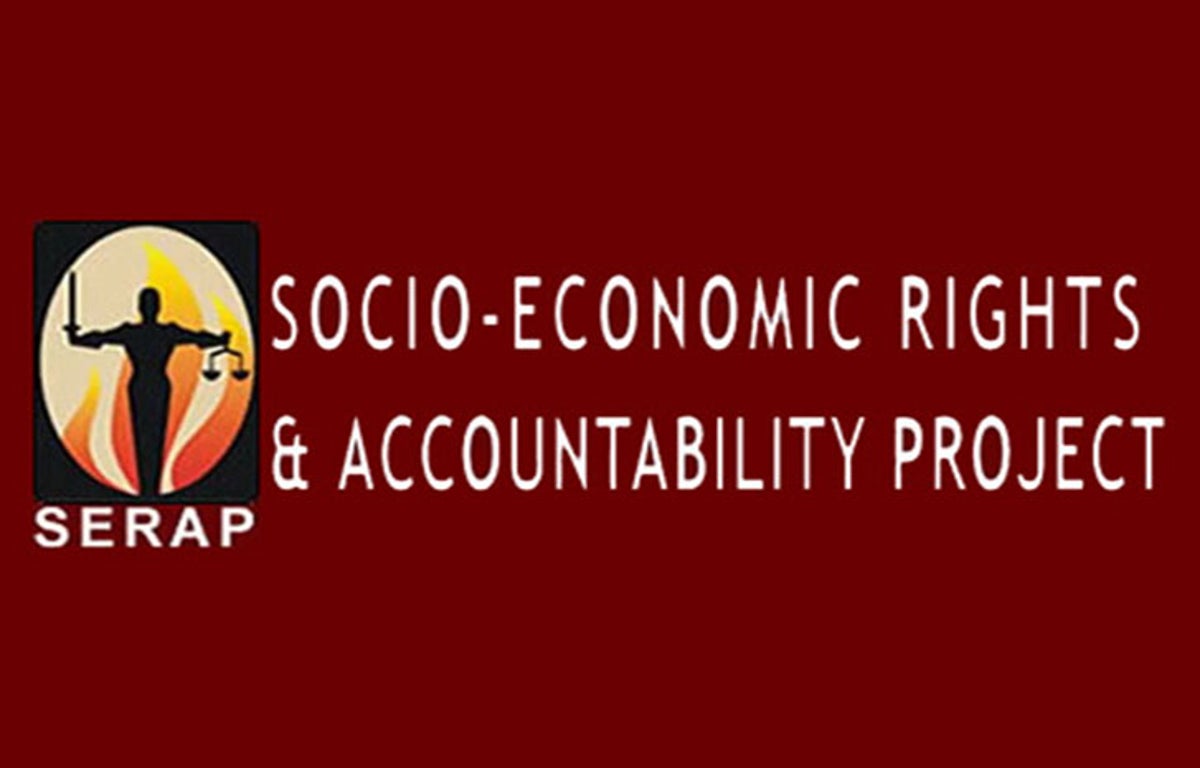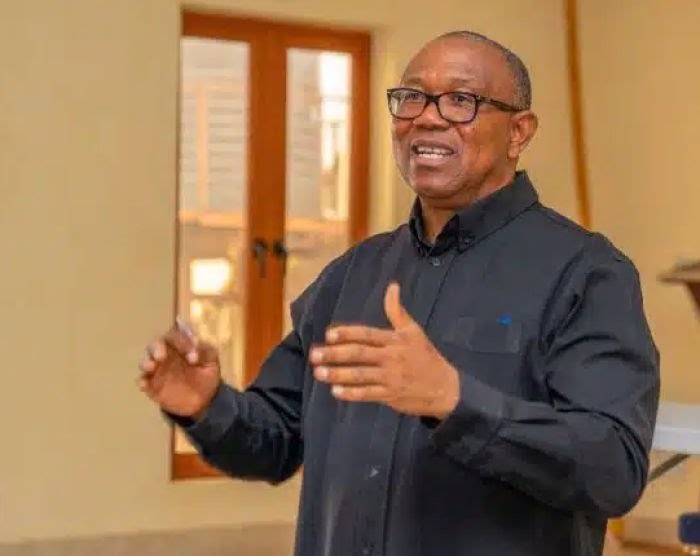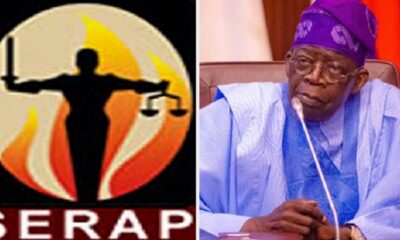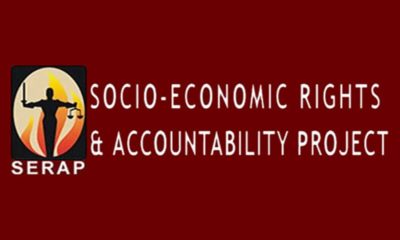NEWS
SERAP Sues Akpabio, Abbas Over NASS’ Running Costs, Legislators’ Jumbo Pay

The Socio-Economic Rights and Accountability Project (SERAP) has filed a lawsuit against the Senate President, Godswill Akpabio and Speaker of House of Representatives, Tajudeen Abbas over “the failure to end the apparently unlawful practice by the National Assembly of fixing its allowances and running costs, and the failure to account for the monthly running costs paid to members.”
According to a statement on Sunday by the SERAP, Senator Akpabio Mr Abbas are sued for themselves and on behalf of all members of the National Assembly.
ALSO READ: SERAP Urges Govs, Wike To Show Details Of Chinese Loans
Recall that former President Olusegun Obasanjo recently alleged that the lawmakers fix their own salaries and allowances, contrary to the recommendation of the Revenue Mobilisation Fiscal Allocation Commission (RMAFC).
In the suit number FHC/ABJ/CS/1289/2024 filed last Friday at the Federal High Court, Abuja, SERAP is seeking: “an order of mandamus to direct and compel Mr Akpabio and Mr Abbas to end the apparently unlawful practice of the National Assembly fixing its remuneration and allowances termed as ‘running cost’.”
The SERAP is seeking: “an order of mandamus to direct and compel Mr Akpabio and Mr Abbas to disclose the exact amount of the monthly running costs being paid to and received by the lawmakers, and the spending details of any such running costs.”
The SERAP is also seeking: “an order of mandamus to direct and compel Mr Akpabio and Mr Abbas to end the alleged practice of paying remuneration and allowances termed as ‘running costs’ into the personal accounts of lawmakers.”
In the suit, the SERAP is arguing that: “The provisions of paragraph N, section 32(d) of the Third Schedule to the Nigerian Constitution 1999 [as amended] clearly make it unlawful for the National Assembly to fix its salaries, allowances and running costs.”
The SERAP is also arguing that, “the alleged practice of paying running costs into the personal accounts of lawmakers is a fundamental breach of Rule 713 of the Federal Government Financial Regulations, which provides that ‘public money shall not be paid into a private bank account.’”
According to the SERAP, “‘Public function’ means activities in the public interest, not against it. The reports that lawmakers are fixing their own salaries, allowances and running costs amount to private self-interest or self-dealing. It is also detrimental to the public interest.”
According to the SERAP, “The constitutional oath of office of lawmakers requires them to ensure transparency and accountability in the exact amounts of salaries, allowances and running costs they receive.”
Similarly, the SERAP is arguing that, “The allegations that lawmakers are fixing their own salaries, allowances and running costs are entirely inconsistent and incompatible with the constitutional oath of office and the object and purpose of the UN Convention against Corruption to which Nigeria is a state party.”
The suit filed on behalf of SERAP by its lawyers, Kolawole Oluwadare, Andrew Nwankwo, and Ms Blessing Ogwuche, read in part: “Directing and compelling the lawmakers to account for and return any misused or mismanaged running costs they collected would build trust in democratic institutions and strengthen the rule of law.”
“SERAP is seeking: an order of mandamus to direct and compel Mr Akpabio and Mr Abbas to refer the allegations on the misuse of the running costs received by members to appropriate anticorruption agencies for investigation and prosecution where there is relevant admissible evidence.
“The country’s international legal obligations especially under the UN Convention against Corruption impose a legal commitment on public officials including lawmakers to discharge a public duty truthfully and faithfully.
“The convention specifically in paragraph 1 of article 8 requires members to promote integrity, honesty and responsibility in the management of public resources.
“Nigerians have a right to scrutinize how their lawmakers spend their tax money and the commonwealth. Nigerians also have a right to honest and faithful performance by their public officials including lawmakers.
“Ending the reported practice by lawmakers of fixing their salaries, allowances and running costs would improve public confidence in the integrity and honesty of the National Assembly.
“Constitutional oath of office requires public officials including lawmakers to abstain from all improper acts, such as fixing their own salaries, allowances and running costs, that are inconsistent with the public trust.
“It is a travesty and a fundamental breach of their fiduciary duties for members of the National Assembly to fix their own salaries, allowances and running costs.
“Rule 713 of the Federal Government Financial Regulations provides: ‘Personal money shall in no circumstances be paid into a government bank account, nor shall any public money be paid into a private bank account.’
“In the Seventh Schedule to the Nigerian Constitution, lawmakers commit to strive to ‘preserve the Fundamental Objectives and Directive Principles of State Policy contained in the Constitution’, [and to] perform their ‘functions honestly, faithfully’, to act ‘always in the interest of the well-being and prosperity of Nigeria’.
“Lawmakers also commit to ‘preserve, protect and defend the Constitution of Nigeria; and abide by the Code of Conduct contained in the Fifth Schedule to the Constitution.’
“SERAP notes that Section 15(5) of the Nigerian Constitution requires public institutions to abolish all corrupt practices and abuse of power. Section 16(2) of the Nigerian Constitution further provides that, ‘the material resources of the nation are harnessed and distributed as best as possible to serve the common good.’
“According to our information, members of the National Assembly are currently fixing their own salaries, allowances and running costs. The running costs are reportedly paid directly into the personal accounts of members.
“Senator Kawu Sumaila, representing Kano South Senatorial District, recently disclosed in an interview with BBC Hausa that each Nigerian senator earns at least N21 million monthly in running costs, salaries, and allowances.
“Mr Sumaila reportedly said, ‘My monthly salary is less than N1 million. After deductions, the figure comes down to a little over N600,000. Given the increase effected in the Senate, each senator gets N21 million every month as running cost.’”
No date has been fixed for the hearing of the suit.
NEWS
Natasha Distorted Facts, Embarrassed The Senate – Akpabio
Senate President Godswill Akpabio has accused suspended Senator Natasha Akpoti-Uduaghan of distorting facts and misrepresenting the Nigerian Senate at an international forum.
Recall that Akpoti-Uduaghan, the senator representing Kogi Central, was suspended for six months over alleged violations of Senate rules.
However, she took her grievances to the United Nations Inter-Parliamentary Conference in New York, where she accused Akpabio of victimization, sexual harassment, and abuse of office.
READ ALSO: Natasha’s Suspension Not Linked To Harassment Claims – Senate
During Thursday’s plenary session, Akpabio condemned her actions, stating that she had embarrassed the Senate by presenting a misleading narrative to the global audience.
“I am aware that she distorted the facts and globalized the matter, embarrassing the Senate by giving a different narrative,” Akpabio said.
He commended federal lawmaker Kafilat Ogbara for intervening and clarifying to international media that Akpoti-Uduaghan’s account did not reflect the true events in the Senate.
The Senate President further criticized Akpoti-Uduaghan for bypassing internal legislative procedures, saying she initially filed a petition in the Senate but later took the matter to court and the international community.
“She brought the matter before the Senate through a petition but did not allow us to examine it. Instead, she took it to court and later to the international community. Actions like these could discourage politicians from appointing women into key positions,” Akpabio said.
His remarks came after he received a vote of confidence from his colleagues, reaffirming his leadership in the upper chamber.
He urged senators to remain focused on legislative responsibilities and not be distracted by controversies.
“I thank you for this vote of confidence. Let us stay focused and avoid unnecessary distractions,” he added.
NEWS
Senate Passes Vote of Confidence In Akpabio Amid Controversy
The Nigerian Senate, on Thursday, passed a vote of confidence in the leadership of Senate President Godswill Akpabio, reaffirming its support despite the controversy surrounding the upper legislative chamber.
The decision followed a motion moved by Senate Leader, Senator Opeyemi Bamidele, under Orders 40 and 51, emphasizing the need for clarity, adherence to legislative procedures, and a renewed focus on governance.
The controversy stems from the suspension of Senator Natasha Akpoti-Uduaghan (Kogi Central) after she accused Senate President Akpabio of sexual harassment.
READ ALSO: Natasha’s Suspension Not Linked To Harassment Claims – Senate
In response, she petitioned the United Nations’ Inter-Parliamentary Union (IPU), decrying her suspension as unjust.
However, the Senate, in a statement to the IPU on Wednesday, refuted claims that her suspension was linked to her allegations, maintaining that she was disciplined for “gross misconduct and disobedience to Senate rules.”
During plenary, Senator Bamidele dismissed suggestions that the Senate was informed of any sexual harassment claims against Akpabio between August 2023 and the present.
He insisted that the matter at hand strictly concerned disciplinary measures.
“I want to make it clear that the matter referred to the Committee on Ethics and Privileges had nothing to do with sexual harassment,” he stated.
“The Senate President did not preside over any case related to such allegations. What was addressed was a flagrant disregard for Senate rules, and we followed due process as guided by the Constitution.”
Bamidele further defended the Senate’s authority to regulate its proceedings, asserting that disciplinary actions, including suspension, were necessary to maintain order and legislative integrity.
“It was never an issue before us that any senator was sexually harassed. We need to move past the events of the last two weeks and focus on our legislative responsibilities. There is critical work before us, including electoral reforms, economic recovery, and tax reform bills,” he said.
Addressing concerns over international reactions, Bamidele clarified that Senator Akpoti-Uduaghan’s statements at the IPU meeting were made in a personal capacity and not as a representative of Nigeria.
“The IPU acted within its own rules, and whatever was said by the senator in question was not as a designated delegate from Nigeria,” he added.
He also called on Civil Society Organizations to remain objective, urging them to focus on genuine cases of sexual harassment rather than politicizing legislative disciplinary actions.
“We have heard you, but we need to concentrate on our work. If we choose to be silent on this matter going forward, know that it is intentional on our part,” Bamidele stated.
Following deliberations, the Senate overwhelmingly passed a vote of confidence in Akpabio’s leadership, commending his handling of the situation.
Deputy Senate President, Senator Barau Jibrin, who presided over the plenary session, emphasized that with the 2024 budget now passed, lawmakers must shift their focus to their oversight functions.
He further stated that the matter is now before the courts and urged the Senate to allow the judiciary to take its course.
NEWS
Peter Obi In High-Level Meeting With Gov Bala Mohammed

Former Labour Party (LP) presidential candidate, Peter Obi, is currently in a closed-door meeting with Bauchi State Governor, Bala Mohammed.
The meeting, which is taking place at the Ramat House in Bauchi, remains undisclosed to the public, as no official reason has been given for the high-profile discussion.
READ MORE: El-Rufai’s Son Makes U-Turn On Peter Obi, Blames APC For ‘Poisoning’ His Mind
However, details are expected to emerge once Obi and Mohammed address journalists after the meeting.
More to follow…………

















